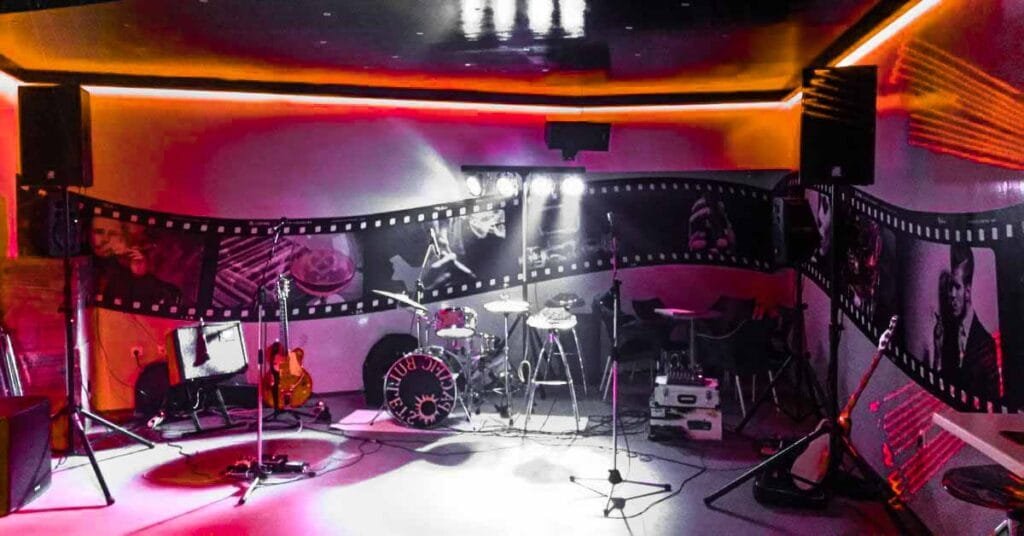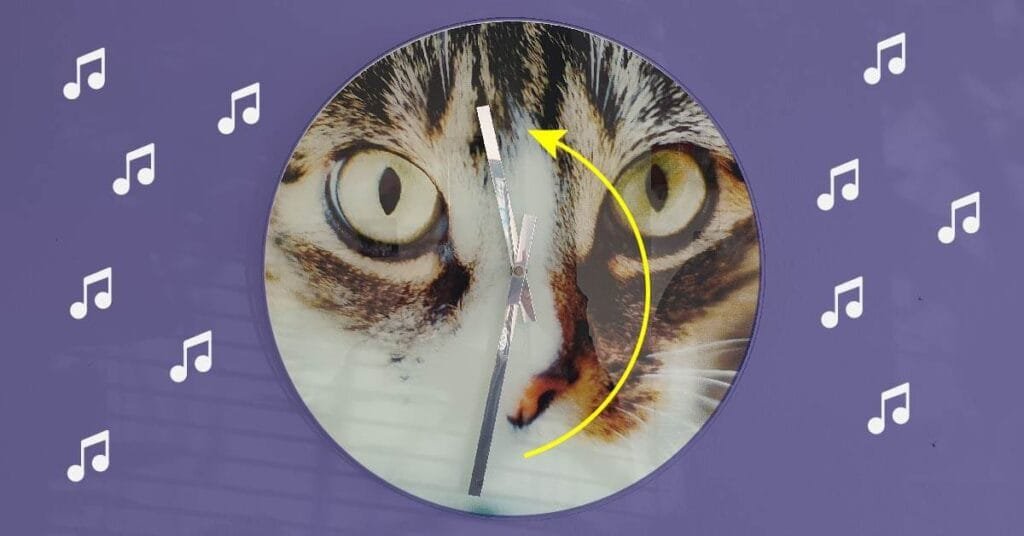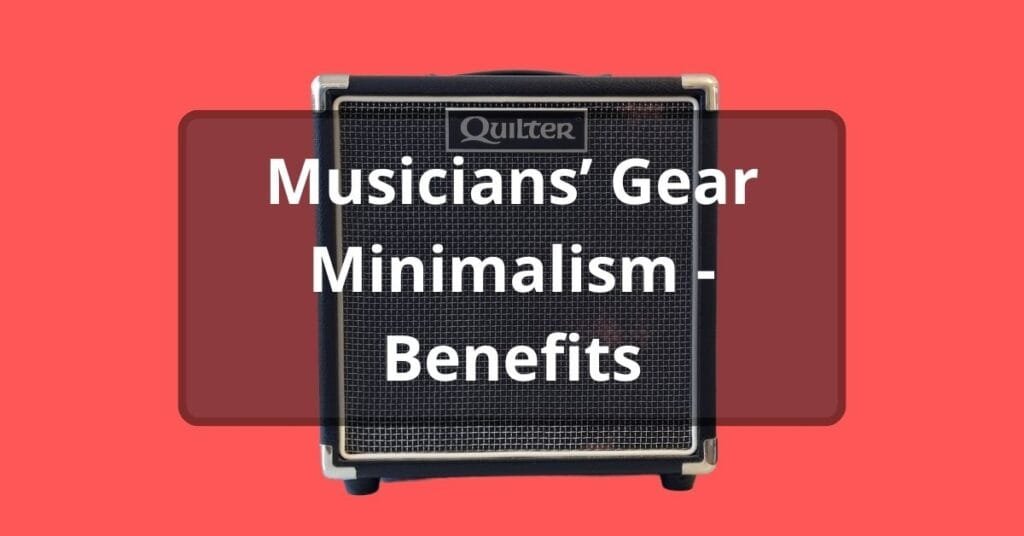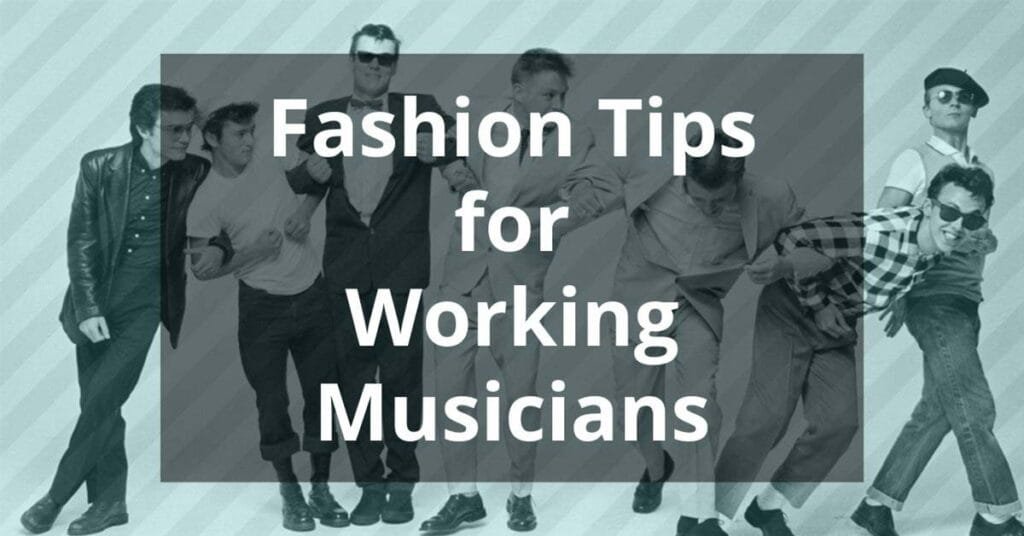The musicians’ secret: How to make money with a cover band
Introduction
Are you a musician who enjoys playing live and wants to make some serious money or maybe even a career doing something you truly enjoy? Many musicians only choose to write, record, and perform their original music. That is something I’ve tried and I respect it with all my heart. What can be more satisfying than playing your songs in front of other people? If you can make a living doing so, you are blessed.
But today, it is harder than ever to make a living recording and playing your original material. Many musicians are struggling to make a living. If you want to play safe and have what it takes, a cover band may be the best secret there is in the music business.
If you want to make a living as a musician or need some additional income you’ve come to the right place! In this article, I will explain exactly how to start a cover band, build your repertoire, book gigs, and all the other things you need to start making money faster than you thought it could be possible.
Many musicians are not aware of the potential of playing in a cover band. A wide range of different types of gigs and audiences is an opportunity for a steady income. Here is what I have learned about playing in a cover band after 791 gigs with Pacific Bullets – my current band.
In this guide, I will share some of the most important tips on how to promote your band, build a strong reputation, choose the right songs, and most importantly negotiate your price.
The pros: why play in a cover band?
Before we go on, we have to say that when we mention bands playing original music we are not talking about the bands that are popular enough to make serious money. We are talking about all the bands that play their music but are not making a living doing so. At least not yet 🙂.
1. Emotional and nostalgic selling point

People love to hear their favorite songs. It reminds them of their youth, lost love, bad times, and good times. It’s all about emotion and nostalgia. People react to songs played in their local pub, hearing a band play those songs live is the closest to seeing the original band play them.
This is the most unique selling point of a cover band. Have that in mind at all times.
2. High and steady demand
Classic oldies and modern hits are always in demand, and so are cover bands that play them. Most people will react better to songs that they already know and love than to bands who play not-so-known original music.
3. Low risk
Club managers and bar owners are risking less by hiring cover bands than bands with original music. In the same way, cover bands are risking less because of a steady demand for this type of entertainment.
4. Wide range of gig types
This is a major positive factor to consider when starting a cover band. There is always some kind of entertainment or promotion going on somewhere. Don’t expect to play various types of gigs in the beginning. You will see what works best for your band only after playing dozens of gigs.
The good thing about different gig types is that your band can always find a type that will perfectly fit the type of cover band you are. Whether you play a specific genre of music or a mix of everything there is a gig type for your band.
Types of gigs (venues):
- Bars and restaurants
- Concert venues – nightclubs
- Corporate events
- Weddings
- Hotels
- Camping resorts
- Music festivals
- Public events (Advent, Halloween, Independence Day,…)
- Private parties
- Cruise ships
- Grand openings (malls, product launches, etc.)
5. Higher paying gigs
Not all types of gigs pay the same but expect to earn more money playing covers at any venue than originals. Corporate events, weddings, and some public events can pay serious money if you have what they are looking for.
The cons: why not play in a cover band
If you are seriously interested in writing and performing your music you probably won’t be happy playing in a cover band. Playing songs that someone else wrote can be uninspiring if you need to express your creativity. This is rarely the case because many popular bands started their careers as a cover band. Nirvana started out as a Creedence Clearwater Revival tribute act. The Rolling Stones and The Beatles played covers in their first years.
Another reason a cover band could not be a suit that fits you is the number of songs you will need to learn to play. Many cover bands are like a live jukebox which means they play many different genres of music from every possible decade.
Specific factors
Before we take a look at the steps we need to take to create a cover band and gradually start making money we should mention some factors that are specific for this profession.
1. Seasonality
This is a major factor where I live. Tourism is the main force that drives the region where I come from. Due to this factor, the majority of gigs I play are during summertime in hotels, camping resorts, and concerts that local tourist boards organize on town squares. I live in a smaller town with very few possibilities for playing gigs throughout the rest of the year. If we want to play gigs during the winter, we need to travel a lot, sometimes hundreds of kilometers abroad.
2. City size
Bigger cities generally have more venues and pubs where you can play gigs throughout the whole year. But it can also mean greater competition to stand out. Radio and TV stations in major cities can also be places where you can find a way to make money with a cover band.
3. Geographic location
Where you live can make a huge difference. Living in a city like New York, London, or Berlin gives you endless opportunities for playing gigs while living in a large city in a country with a lower living standard doesn’t necessarily offer you the same. In some countries, you can make a living by exclusively playing only at weddings. Some countries and cities have a long tradition of playing in clubs.
Cover bands vs Tribute acts
A cover band is a band that plays covers, while a tribute band also plays covers of one specific band (or two), but also impersonates the band’s looks and style. A tribute band tries to look and sound as close to the original band as possible.
If you want to form a tribute act you need to live in an area where there are many venues or be prepared to travel a lot.
How to start playing and earning money with a cover band
1. Find the right people for the band
This can be hard if you don’t know too many musicians who have a similar mindset about forming a cover band. On the other hand, if you already have a band with your good friends, chances are you can easily be on the same page. Forming a cover band that earns money is a profession and everybody needs to be aware that success does not come overnight.
People come, and people go, this is something that is normal for almost everything in life. Time will show who’s in it for the long run and who isn’t. It is quite normal to have multiple backups in case someone can’t play some gigs.
2. Finding your niche
This can take time if you have not determined what kind of cover band you want to be from day one. It’s a trial-and-error thing. I started with the idea of a retro band that mostly plays rockabilly. But through the years I’ve seen people react well to surf and swing music so we gradually added songs from these genres. The band is still defined as a 50’s and 60’s cover band, but with a repertoire that is based on various genres like rockabilly, rock and roll, surf, swing, and jazz-pop standards that go along very well. Playing songs from Deep Purple or Led Zeppelin wouldn’t make much sense even though they are from the 60’s.
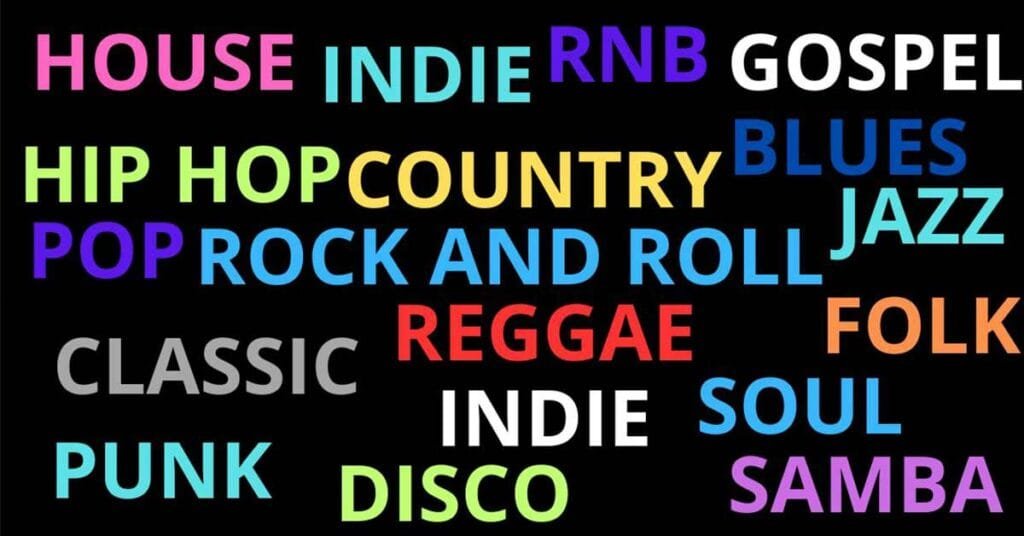
Finding a niche is something that is not that easy. It will depend on your geographic area, the type of venue you will be playing, the type of audience you will be playing to, and many other factors. It is a mixture of adapting to these outside factors and to your personal. The singers in the band should choose artists and songs that sonically match their vocal capabilities. Having all this in mind from the beginning will save you time in the long run.
If you specialize in playing weddings, you will be better off playing various genres of music from different decades. Playing different styles of music requires the versatility of guitar sounds, male and female vocals, and additional instruments. Quite a lot of bands start this way making it hard to stand out. Only the best “all-genre” cover bands can earn serious money.
A niche doesn’t only mean a specific genre or era of the music you play. It can mean that you play covers in a specific way or with instruments that were not used in the original recordings.
When playing a specific style of music or songs from a certain era always try to adapt your clothing and accessories.
3. Build a strong and unique repertoire
The repertoire may be the most important factor for success. Don’t just randomly pick songs from your favorite artists or eras. Think thoroughly before deciding in which order to play your setlists. If you want to play different styles of music try to group them in smaller groups. First play 3 or 4 songs from one genre, then play a couple of songs from another genre or decade.
Your repertoire strongly correlates with your niche, but not any songs will do. The songs can be a mixture of well-known classics and less-known songs where you can express yourself.
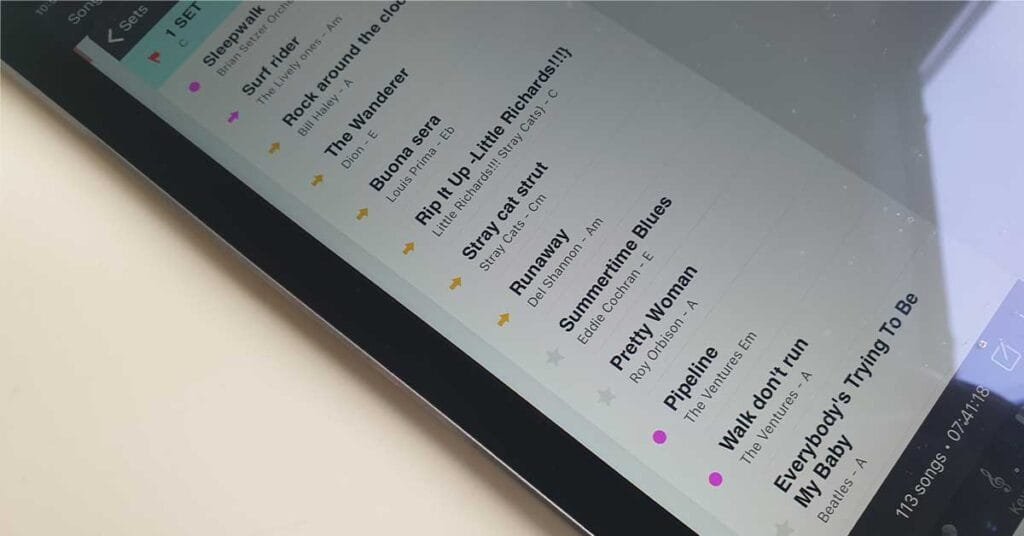
The way songs are ordered tempo-wise is also important. You can’t just play 10 fast rock and roll songs at a corporate event. People will get tired quickly. Instead, play 3 to 5 uptempo songs, followed by a ballad, then gradually build up the tempo again, and so on. Think of the songs played throughout the concert as a roller coaster that speeds up towards the end.
4. Get good-quality gear
If you want to earn some money playing in a cover band, you should be professional about every detail. Having good-quality gear that will not let you down is a must. Good quality doesn’t have to cost a fortune. You can buy above-average-quality musical gear for far less money than a decade or two before.
Don’t buy more than is essential in the beginning. After time you will see what type of musical gear will be best for your cover band. If you are planning on playing frequent gigs get gear that is small and lightweight so you can focus more on your playing rather than hauling heavy and large equipment.
5. Rehearse frequently
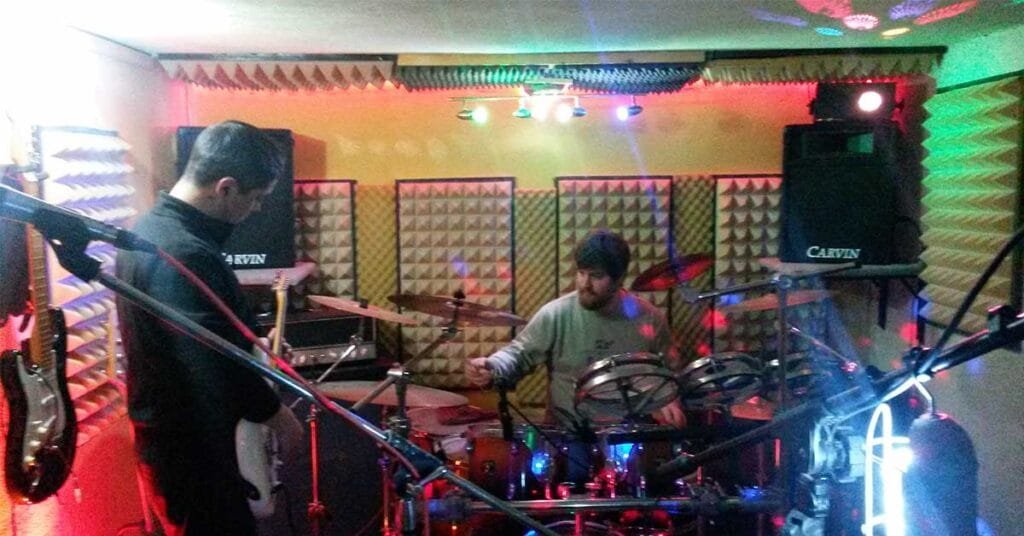
Musicians with experience can build a well-rehearsed setlist in far less time than someone just starting to play in a band. When the energy in a band is right, having frequent rehearsals is more like having fun with your friends rather than doing a job. The experienced bunch can easily learn their setlists in 5 to 10 rehearsals. The latter will need more time, but not more than a couple of months meeting 1 to 2 times a week.
When you start gigging frequently, your gigs become your rehearsals.
6. Marketing your band
After a couple of gigs, you will see where things are going. If you need some changes regarding the type of cover band you want to be wait till you polish your act so you know exactly what you want to promote. Don’t just be one of those cover bands that play the same songs over and over again. Be unique.
Once you have a strong idea of what type of cover band you are, start promoting. The fastest and easiest way is through social media channels. Facebook, YouTube, and Instagram are ideal for this job.
A professional-looking website that represents your band’s niche is still the number one place that serves as a business card for serious gigging opportunities. Your website should include basic information about what your band is all about, who are the members, a list of songs you most play, and of course your contact information for booking. Great photographs of the band are essential. Video clips of your live performance embedded from YouTube are also a way for people to see what your band is about.
Networking is an ongoing process. Don’t forget to tell all your friends about your new exciting cover band. Call your local radio station and online news sites and ask if they can interview your band. They are always on the lookout for new things, that’s what they do! Build relationships with venue managers, event planners, bar owners, and anyone who is in the music industry.
7. Booking gigs
When you are just starting with your cover band any gigs you can manage to book are OK. The best way to start is to pay a visit to your local pubs and venues that have new acts playing there regularly. Playing for free is sometimes an option, but only once or twice, and only if you think you will get a good promotion. After you polish your act a bit, your confidence as a negotiator will become stronger. Securing a steady flow of gigs is what a successful cover band is all about.
Before you approach clients, it’s important to define the prices you will be asking. Different types of gigs are priced accordingly. Here is a list of factors that determine your price:
- Number of band members
- Length of performance
- Who provides the PA and lighting
- Distance to venue
- Type of performance
Be prepared to offer different prices for various scenarios at a venue. This will give your band a professional image. Avoid undervaluing your act. Before you meet or call a venue manager try to find out what prices other bands are getting. If your price is too low, you may risk the manager thinking that you are desperate to play and not so good.
Steady gigs are gigs that are played once a week or more at the same venue for longer periods. My band plays many steady gigs throughout the summer. Every Monday we play at one hotel, every Tuesday at a huge campsite, and so on. Depending on the venue and season these gigs can last anywhere from two to six months. Booking a couple of steady gigs and a one-time beach bar or festival gig every week adds up to a lot of gigs.
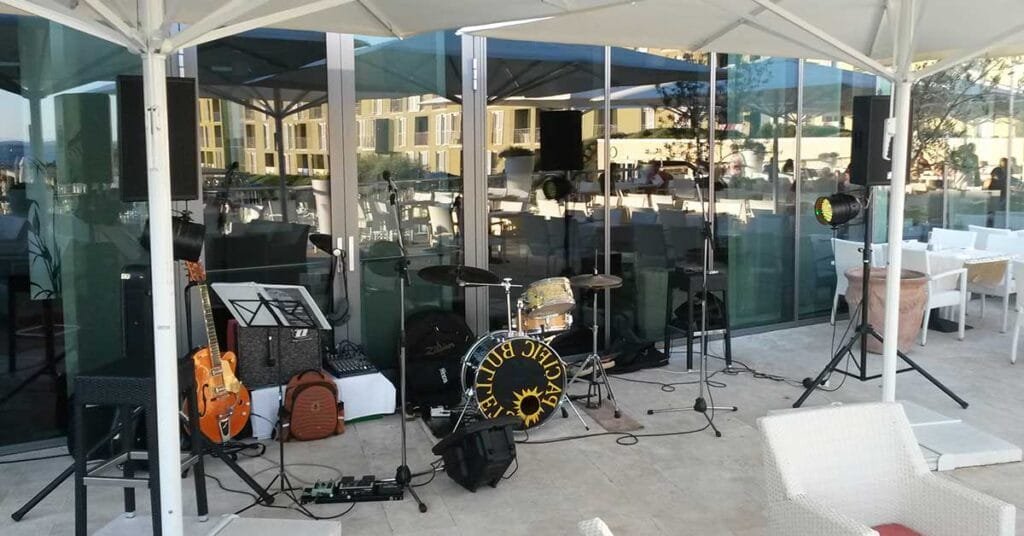
Always be prepared to negotiate the terms of the contract. Details such as how long will the gig last, when will it start and end, how long will breaks be, the number of sets, are food and drinks included, who will be providing the PA and lighting, and the price are always part of a gig contract. Changes in schedule and penalties for cancelations can also be part of a steady gig.
8. Be prepared for versatility
Here we are not talking about the versatility of genres you should play. That is something a cover band that plays a wide repertoire is dealing with. We are talking about being prepared for different types of gigs that your niche-specific cover band could potentially play.
A wedding event that can last for a long time will expect you to play more songs than you would at a music festival. If you are a retro cover band you can expand your setlist with songs that are new of age but played in your specific retro-styled arrangements. It is very common to be asked if you can learn a new song or two for a wedding. So be prepared for that too.

You will need more ballads and mid-tempo songs for a laid-back cocktail party than for a corporate event where they want you to play dance tunes. Don’t be surprised if you get asked if you can play a gig unplugged with acoustic instruments or as a duo instead of the whole band.
If you prepare your band with enough songs and different setlists for different occasions you will be able to play many types of gigs with ease.
Steady lower-paid gigs vs single higher-paid gigs
Expanding your revenue streams
Once you earn a decent reputation as an exciting cover band you can expand your revenue streams the same way that bands with original material do.
Diversifying your band’s monetization opportunities is what will help you through these unstable times. The pandemic touched every musician in the world. Those who only relied on playing live for income got hit very hard. On the other hand, musicians who had other revenue streams going on survived the crises with fewer issues money-wise.
Recorded music
Many musicians believe they would break the law if they sold recordings of their covers. If you distribute the music yourself you will have to give a percentage of any revenue you get to the songwriters. You don’t have to earn anything from YouTube videos, but if you get lots of views and become popular, you will be able to make money much easier with other types of revenue. Streaming services like Spotify, Bandcamp, iTunes, or DistroKid handle all the legal work making it easier for musicians to work with them.
Merchandise
T-shirts, mugs, and caps with your band’s logo can help your band expand its revenue stream. Branded merchandise also helps with your band’s identity.
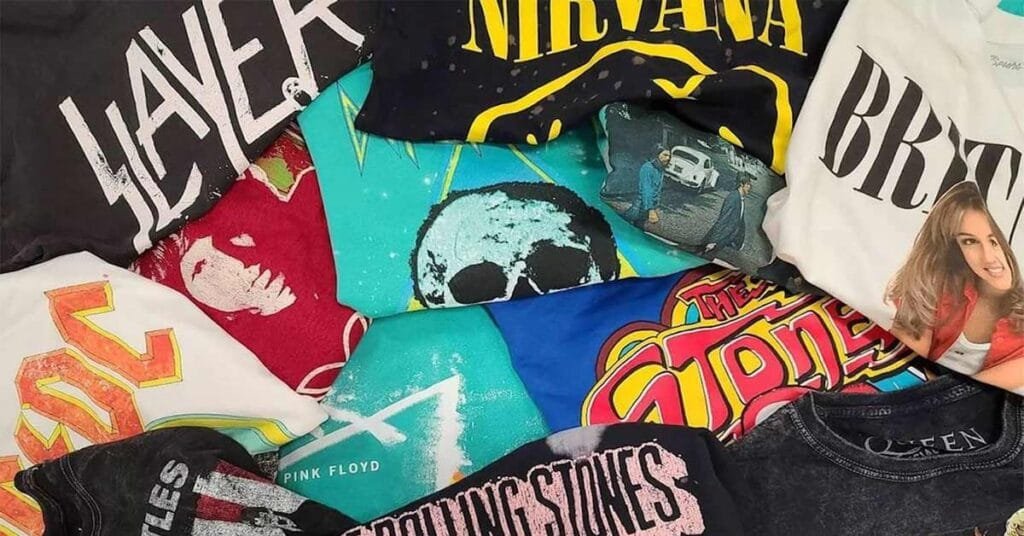
Conclusion
In today’s fast-forward evolving music industry the keys to success are diversity and balance. A cover band direction in your career might be the best and safest way to secure a steady income as a musician. Constantly adapting to your client’s needs, keeping your act a high-quality professional performance, and working on your social media and other networking will secure a lucrative business. Those who wish to go the artistic way always have the chance to make some additional money with a cover band until they become successful as an artist.
The possibilities for booking gigs as a cover act are endless. Corporate events, local pubs, mall openings, and weddings always need live music. Be prepared to perform as a full band, a trio, a duo, or a solo act if needed. Create set lists for every type of gig. How people who attend your shows react to your cover band’s show is the most important factor for success. Always put them in the first place. Then with that in mind, adapt your performance to your preferences and you will create a win-win situation. As time goes by, and your cover band builds a strong reputation, you will see financial growth, both in terms of the number of gigs and the price you will be getting for your performances.
